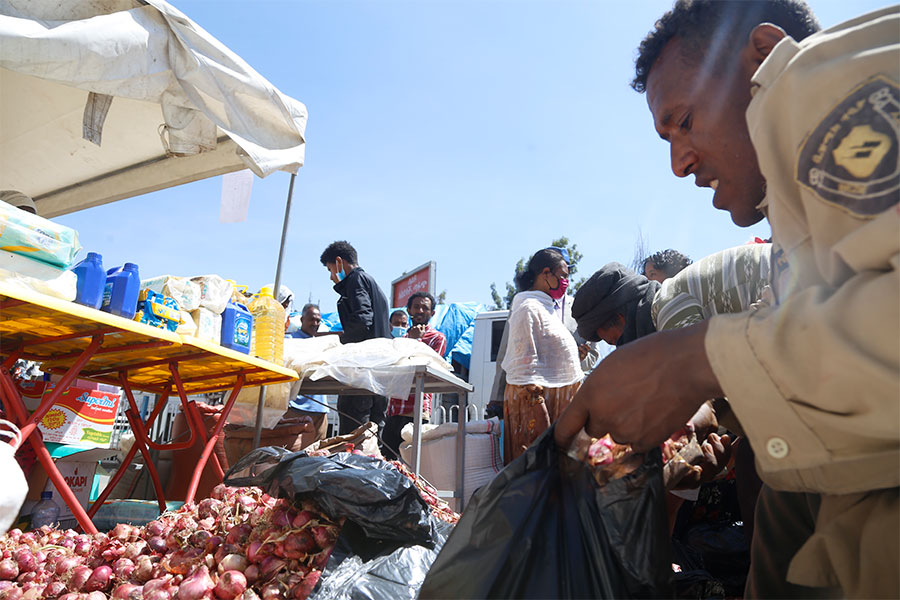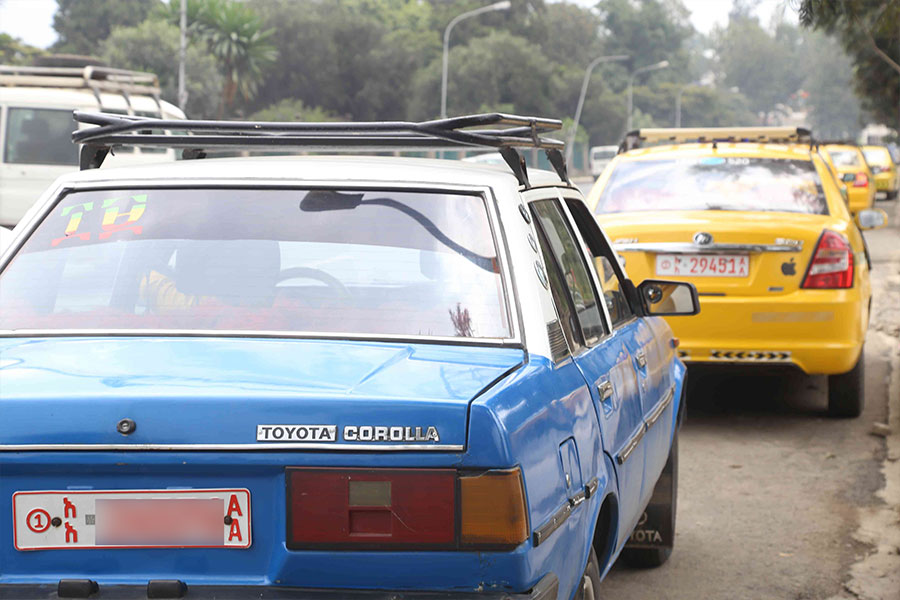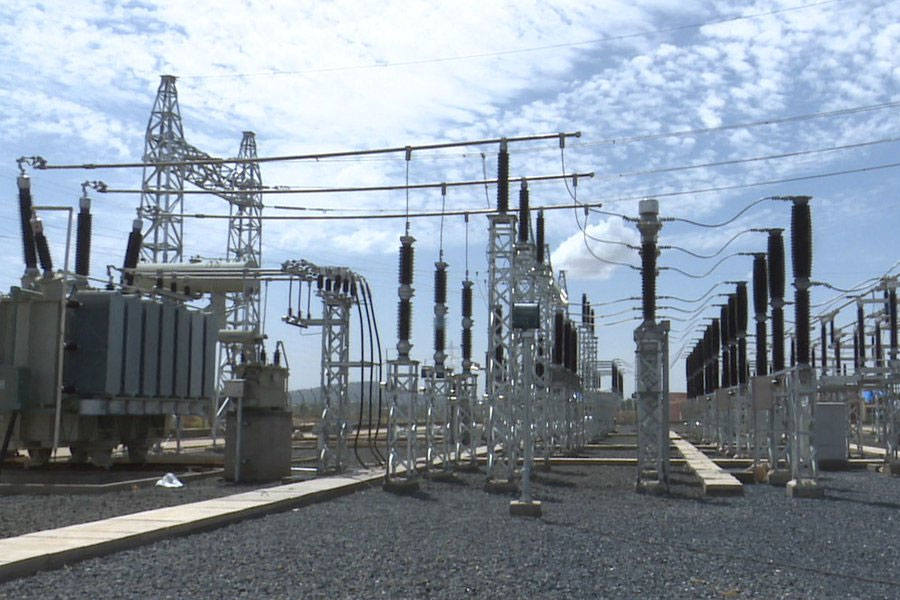
Fortune News | Sep 18,2021
Women wearing netela, a white cotton garment with woven coloured borders, and men in all-white traditional clothes can be spotted all across Addis Abeba, especially when holidays approach. The bleating of herds of sheep freshly arrived from the countryside, the crowing of roosters, and the sounds of chants and prayers from churches signify that the public is making ready to welcome the upcoming Genna or Christmas holiday.
Following a fasting period that lasts over 40 days, Ethiopian Christmas is celebrated two weeks after the holiday is observed in the Western world. Although several different local Christmas traditions and ceremonies exist, such as Yegenna Chewata(a traditional field hockey game popular in the Ethiopian highlands), many have largely disappeared from urban areas. However, they still exist in rural parts of the country.
Instead, celebrating Christmas with the exchange of gifts and the decorating of Christmas trees after the Western fashion has become more commonplace these days, particularly in the capital. It is estimated that Christmas trees were first used about 500 years ago in northern Europe. However, some historians assert that the practice was born from the Ancient Egyptian tradition of bringing fresh tree branches into houses on the winter solstice, the shortest day of the year.
No matter the origin, the tradition is gaining popularity among the residents of the capital.
"It doesn't have any spiritual connection with Christmas, but I feel good when I have the tree in my home," said Dawit Kibru, who was a buyer looking for an artificial Christmas tree at the recently opened Christmas Bazaar in Mechare Meda in the Sarbet area.
Residents of the capital can buy a natural Christmas tree from one of the many plant nurseries in the city or an artificial tree from one of the many shops that supply the product imported mainly from China.
The nurseries sell trees year-round but normally see a boost in sales around the Christmas season, according to Gebretsadkan Surafel, owner of one in a cluster of nurseries that stretch from the Cherkos neighbourhood to Kera. The market for plants and seedlings through the business faces stiff competition from the artificial market during the Christmas season.
"This year, the market for Christmas trees has slumped," said Gebretsadkan. "For the past three years, we've been selling around 40 trees and more than 500 flower bouquets during the Christmas season, but now it has declined to a dozen trees and half the number of bouquets."
Gebretsadkan attributes the Novel Coronavirus (COVID-19) pandemic and the country's recent unrest for the decline in sales.
He added that the customers that come looking for Christmas trees are usually members of the diaspora and the upper-middle-income residents of the capital. Gebretsadkan also mentioned that the nurseries offer delivery services for the larger trees through agreements with nearby truck drivers.
Tigistu Fikre, the co-owner of Tigistu, Abduljelil & Friends Plant Nursery in Cherkos, told Fortunethat his business faces many challenges. He claims that he is even struggling to meet payments for the trucks that deliver water to his nursery and attributes the problem, in part, to the proliferation of businesses like his. He also mentioned that many in the business, including himself, struggle with space issues.
Another trader Abdulselam Shemsu sells flowers, Christmas trees and other plants at Ethio-Amazon, his shop located around the Kara Kore area. Like the others, he also reported that the demand for Christmas trees has been disappointing this year.
He offers several species of trees at his shop, the most expensive of which is Araucaria with a price that ranges from 2,000 Br to 5,000 Br depending on the height of the tree in question. Ficus, Tuya and Cypress varieties are also commonly sold as Christmas trees, and their prices vary from a minimum of 150 Br to up to 3,500 Br depending on their height and species type, according to Abdulselam.
“Natural trees are more advantageous [for the customer] than artificial ones, because they last longer and they are more beautiful and pleasant," said Abdulselam. "Besides, they are not thrown away after Christmas passes and can be planted in a garden or yard instead."
However, those who operate plant nurseries maintain that the artificial market garners more customers because of its convenience and low-maintenance nature. They also state that the living spaces, or lack thereof, of customers play a large role in purchasing artificial trees instead of the natural option.
Jorka Events has recently opened its annual Christmas bazaar and exhibition at Mechare Meda in the Sarbet area after a year of silence due to the COVID-19 pandemic. Around 250 traders from different parts of the capital participate in the event, hoping to partially make up for a slow business year.
Among them is young businessperson Yeabsira Chernet. She sells flowers, artificial Christmas trees, and other decorative materials for the Christmas festivities at her stall at the exhibition.
“It's the second time that I'm participating in an exhibition," she said. "The market this year is slightly different from last year because of the pandemic,” she explained, referring to a perceived decline in the number of customers.
Yeabsira stated that she is hoping the Bazaar will help her sell artificial Christmas trees ranging in height from one metre to three metres. She explained that a tree's cost could be anywhere between 500 Br and 6,000 Br, depending on height and quality.
Another vendor offering artificial trees at the Bazaar, who wished to remain anonymous, stated that the current pandemic and issues with importing the plastic trees from China have forced her to raise her prices and have made the business untenable.
Two shoppers who spoke to Fortuneat the Bazaar stated that they could not purchase the artificial trees due to the high asking prices. They allege that the values have doubled in comparison to what they paid last year.
It appears that both the suppliers of natural trees and their counterparts peddling the artificial versions have been struggling to attract customers this Christmas season.
“The pandemic affects every sector, be it nationally or globally," said Werotaw Bezabih (PhD), general manager at Teanius Training & Consultancy. "So every business should implement new strategies in their work to deal with this difficult situation.”
He added that these businesses need to have an entrepreneurial spirit to create a model marketing method suitable to the pandemic.
As Ethiopia is becoming more involved in the digital world, they need to prepare online platforms to make advertisements and sell their products, according to the expert.
Besides, they need to create different working ideas like selling their products from cars rather than keeping customers at their shops, he suggested. Hiring good salespeople and better research into their market were some of the other core points raised by the general manager.
PUBLISHED ON
Jan 03,2021 [ VOL
21 , NO
1079]

Fortune News | Sep 18,2021

Fortune News | May 08,2021

Fortune News | Nov 27,2021

Radar | Sep 10,2021

Commentaries | Jan 22,2022

Fortune News | Dec 24,2022

Commentaries | Jan 18,2019

Films Review | Oct 31,2020

Fortune News | May 21,2022

Fortune News | Sep 10,2021

Dec 22 , 2024 . By TIZITA SHEWAFERAW
Charged with transforming colossal state-owned enterprises into modern and competitiv...

Aug 18 , 2024 . By AKSAH ITALO
Although predictable Yonas Zerihun's job in the ride-hailing service is not immune to...

Jul 28 , 2024 . By TIZITA SHEWAFERAW
Unhabitual, perhaps too many, Samuel Gebreyohannes, 38, used to occasionally enjoy a couple of beers at breakfast. However, he recently swit...

Jul 13 , 2024 . By AKSAH ITALO
Investors who rely on tractors, trucks, and field vehicles for commuting, transporting commodities, and f...

Jun 28 , 2025
Meseret Damtie, the assertive auditor general, has never been shy about naming names...

Jun 21 , 2025
A well-worn adage says, “Budget is not destiny, but it is direction.” Examining t...

Jun 14 , 2025
Yet again, the Horn of Africa is bracing for trouble. A region already frayed by wars...

Jun 7 , 2025
Few promises shine brighter in Addis Abeba than the pledge of a roof for every family...